Guitar Strings for Beginners: Everything You Need to Know

Getting started on your guitar journey, or hopping back on it after a hiatus, is super fun, super rewarding, and super cool.
It can also be super overwhelming, and sometimes... a little bit painful!
Choosing the right guitar strings is one of the easiest ways to make your guitar sound better and feel easier to play—especially if you’re a beginner or picking the guitar back up after a break.
With so many options available—different materials, gauges, coatings, and constructions—it’s easy to feel overwhelmed. The good news? We're here to help you narrow down your choices and pick (literally) the right strings for you.
In this guide, we’ll break down the most important things to know about guitar strings, explain how different types affect tone and feel, and help you choose the best guitar strings for your playing style—so you can spend less time (and money) guessing and more time playing.
Why Guitar Strings Matter
Guitar strings play a massive role in how your instrument feels and sounds. Even a high-quality guitar can feel stiff, dull, or uncomfortable with the wrong strings installed.
The right guitar strings can:
- Improve tone and clarity
- Make fretting notes easier
- Reduce finger fatigue
- Help your guitar stay in tune
For example, heavier strings work well for players who want to focus on strumming, tune down or play aggressively. Lighter strings are often better for lead players who want to play melodic lines or bend their strings, beginners, or players with a lighter touch. Matching your strings to your playing style makes a noticeable difference in both comfort and confidence.
Different Types of Guitar Strings
If you’ve ever searched for guitar strings online or walked into a music store, you’ve probably seen dozens of string options behind the counter. Let’s do a quick rundown of the most common types you'll encounter so you know what to expect from each.

Acoustic Guitar Strings
Most steel-string acoustic guitars use either 80/20 bronze or phosphor bronze strings.
Phosphor Bronze Strings
Phosphor bronze strings offer a warmer, more balanced tone with stronger midrange presence. They also last longer, making them a popular choice for frequent players and gigging musicians. Our phosphor bronze acoustic strings are called Naturals, and they wind up beautifully on all makes and models of acoustic guitar.
One important note! Because acoustic guitars don't usually have the assistance of an amplifier to project their sound, they typically use slightly heavier string gauges than electric guitars. Those heavier strings help to drive the top of the instrument and produce a full, toneful sound with plenty of projection.
80/20 Bronze Strings
80/20 bronze strings are known for their bright, crisp tone and strong high-end clarity. They’re great for players who want a fresh, lively sound—but they tend to lose that brightness faster than other options. We call our 80/20 bronze strings Brights, and they have the classic sound of feel of old school acoustics that's often preferred by folk players.
Electric Guitar Strings
Electric guitar strings are usually made from steel with different outer windings. Modern electric strings will feature a hexagonal core with nickel-plated steel wrap wire.
Nickel-Wound Strings
Nickel-wound (nickel-plated steel) strings are the most popular electric guitar strings. They provide a balanced tone with clear highs, solid lows, and a comfortable feel for most players. Our nickel-wound Signatures are our flagship electric sets and have become the string of choice of tons of players – from beginners to pro artists.
Pure Nickel Strings
Pure nickel strings sound warmer and smoother, often favored by players chasing vintage tones. We call our pure nickel strings Broadways, and they are made just like the strings you'd find in the '50s and '60s - but with modern production practices to make sure each one sounds amazing.
Stainless Steel Strings
Stainless steel strings are bright, durable, and long-lasting. They maintain clarity over time but can feel stiffer and may cause faster fret wear on non-stainless frets.
Roundwound vs. Flatwound Guitar Strings
Roundwound Strings
Roundwound strings are the most common choice and what you'll probably be looking for if you're just getting started with guitar. They have a textured feel and produce a bright, dynamic tone suitable for most genres.
Flatwound Strings
Flatwound strings have a smooth surface and a warm, mellow sound. They’re often used for jazz and can sound pretty subdued for rock or metal styles. If you're taking jazz lessons and aren't sure if you should be playing roundwounds or flatwounds – ask your teacher!
Coated Guitar Strings
Coated guitar strings feature a thin protective layer that resists corrosion and extends string life. They sometimes feel slicker under the fingers, but they can last significantly longer than uncoated strings – think 3-4x longer, depending on the player!
While some coated strings slightly reduce high-end brightness, modern coatings are designed to preserve clarity and tone while improving durability. Stringjoy electric Orbiters and acoustic Foxwoods have a light enamel coating on their wrap wire only. That means they have the long-lasting benefits of coated strings, but they sound and feel way more natural than some other coated strings that can be dull and "flubby."

Soft Touch Strings: Comfort Without Compromise
Learning to play guitar is hard enough without dealing with hand or finger pain. And that’s why we created Stringjoy Soft Touch guitar strings.
Soft Touch strings aren't just "light." They're engineered for balance that your fingers will respond to no matter your experience level. Crafted in Nashville with the same USA-sourced, premium materials you'll find in all Stringjoy offerings, Soft Touch strings are proof that comfort and killer tone can finally play nice together.
Available for both acoustic (phosphor bronze!) and electric (nickel!) guitar, Soft Touch sets feature gauges you won't find in our other sets, and have been engineered to reduce finger fatigue and discomfort. How? By coming up with brand new combinations of light cores and wrap wire to achieve the ideal balance of great feel and great sound. The result is a set of strings that feels noticeably easier to fret down while still delivering exceptional tone, clarity, and responsiveness.
Soft Touch strings are ideal for beginners, returning players, folks who are coming back from injury, or anyone looking for a more forgiving playing experience without sacrificing sound quality. By making the guitar easier and more comfortable to play, Soft Touch strings can help new players practice longer, progress faster, and enjoy time with their instrument more than ever.
What String Gauge Should Beginners Choose?
String gauge refers to the thickness of the strings and has a major impact on playability. Technically speaking, it's the full diameter of the string. Heavier gauges are thicker strings, and lighter gauges are thinner.
Light gauge strings are ideal for easier playing, bending, barre chords, and light strumming.
Heavier gauge strings provide more stability under your fingers and can be great for rhythm playing and fingerstyle.
If you’re unsure where to start, here's a general recommendation.
For Electric guitar: Somewhere between 8-10 gauge strings, with 8s being pretty dang light! 9 or 9.5 is a sweet spot for many beginner electric players.
Acoustic guitar: 10 or 11 gauge strings will be light enough to be comfortable while providing projection and volume. The tone of 11s will be a bit fuller and louder!
The best guitar string gauge ultimately comes down to personal preference, so don’t be afraid to experiment!

Guitar String Maintenance Tips
Proper string care helps maintain your strings' tone and playability. Here are a handful of tips to extend the life and vibrance of your new strings.
- Wash your hands before playing
- Wipe down strings and fretboard after each session
- Change strings when they sound dull or feel stiff
Fresh strings sound better and feel better—simple as that!
Beginner's Best
These Stringjoy staples will make the early part of your guitar-playing journey feel great and sound even better.
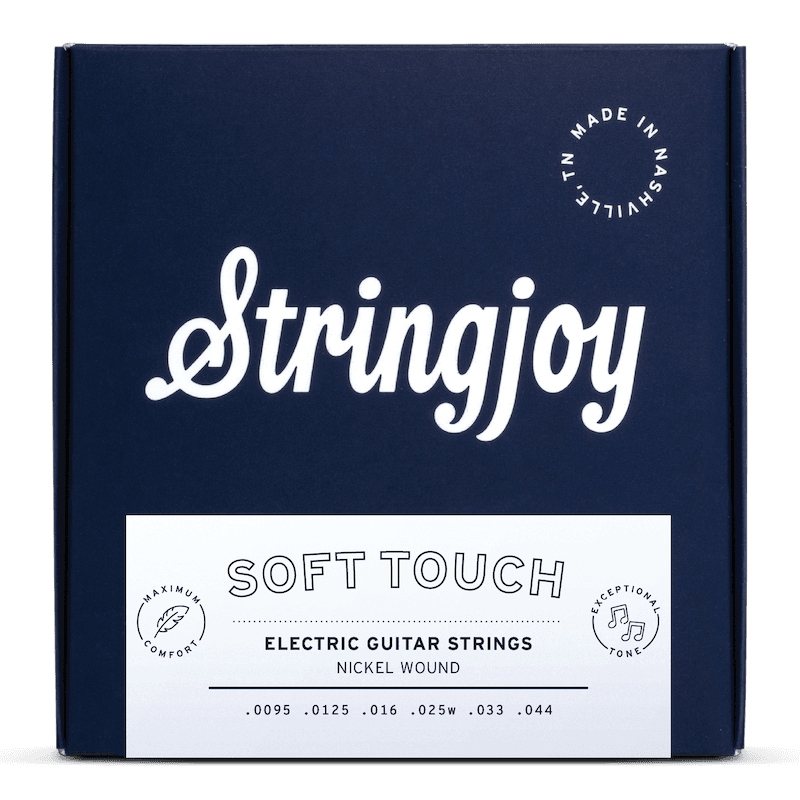
Stringjoy 9.5-44 Soft Touch Signatures - Nickel Wound Electric Guitar Strings
Stringjoy 10.5-47 Soft Touch Naturals - Phosphor Bronze Acoustic Guitar Strings

Stringjoy 9-42 Balanced Super Light Gauge Orbiters - Coated Nickel Electric Guitar Strings

Stringjoy 9-48 Heavy Bottom Super Light Gauge Signatures - Nickel Wound Electric Guitar Strings

Stringjoy 11-52 Super Light Gauge Foxwoods - Coated Phosphor Bronze Acoustic Guitar Strings
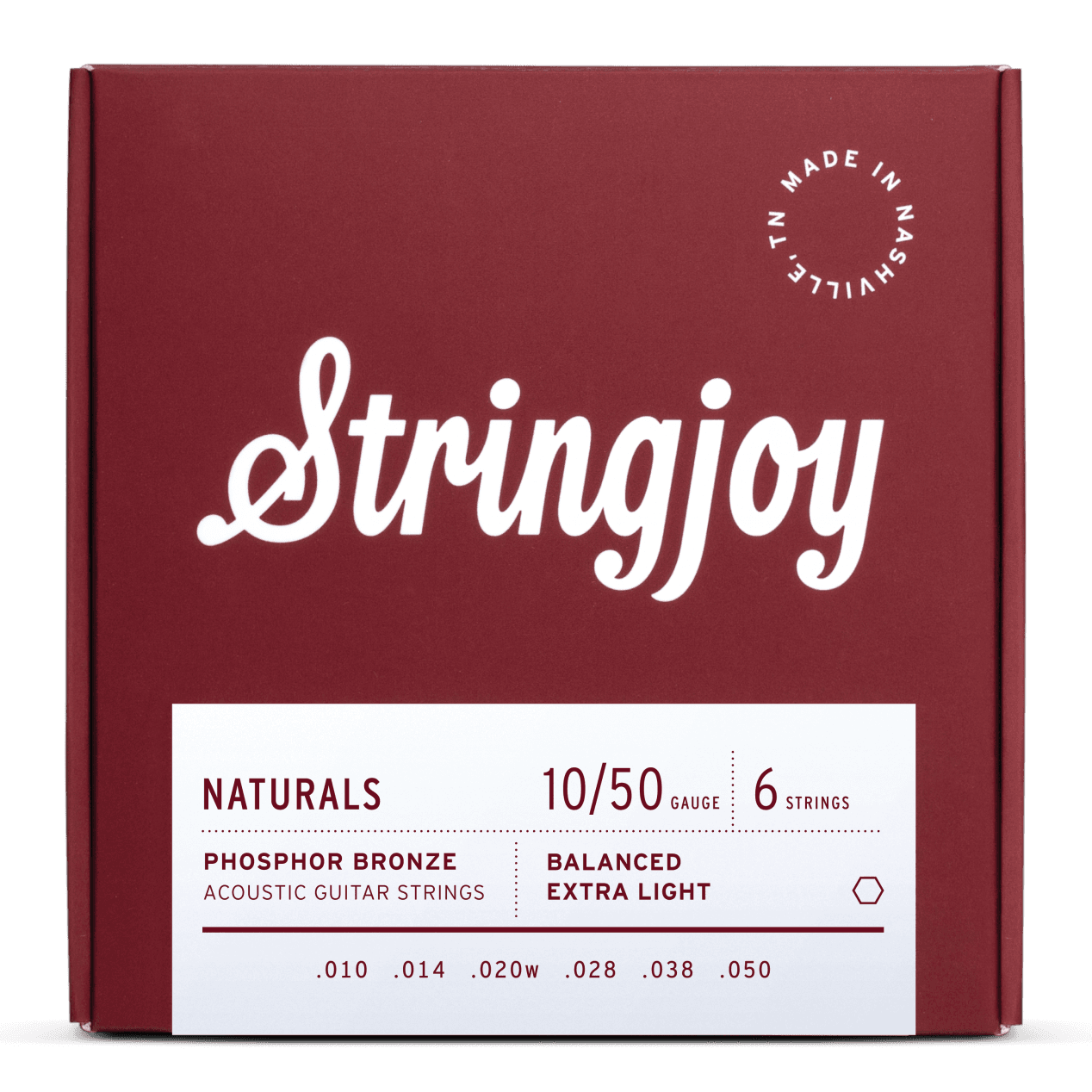
Stringjoy 10-50 Extra Light Gauge Naturals - Phosphor Bronze Acoustic Guitar Strings
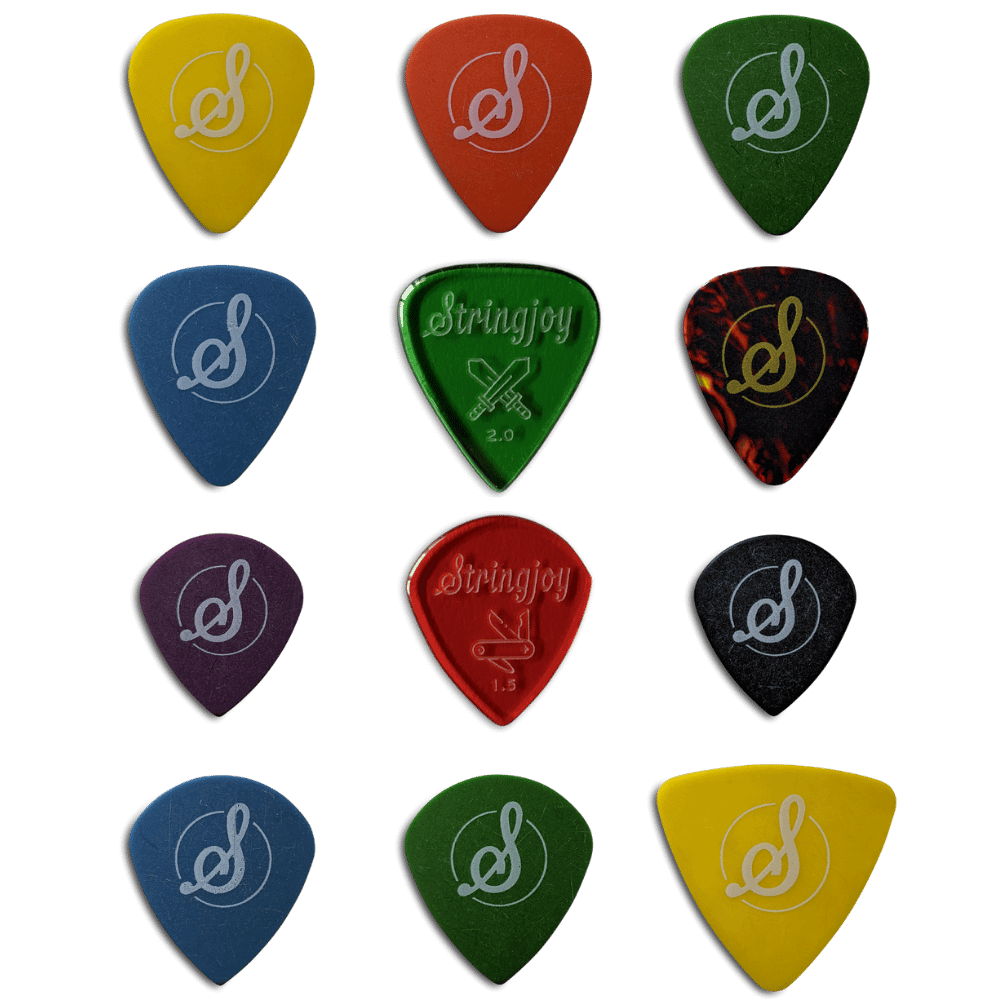
Stringjoy Best-Selling Pick Sampler - 12 Pack
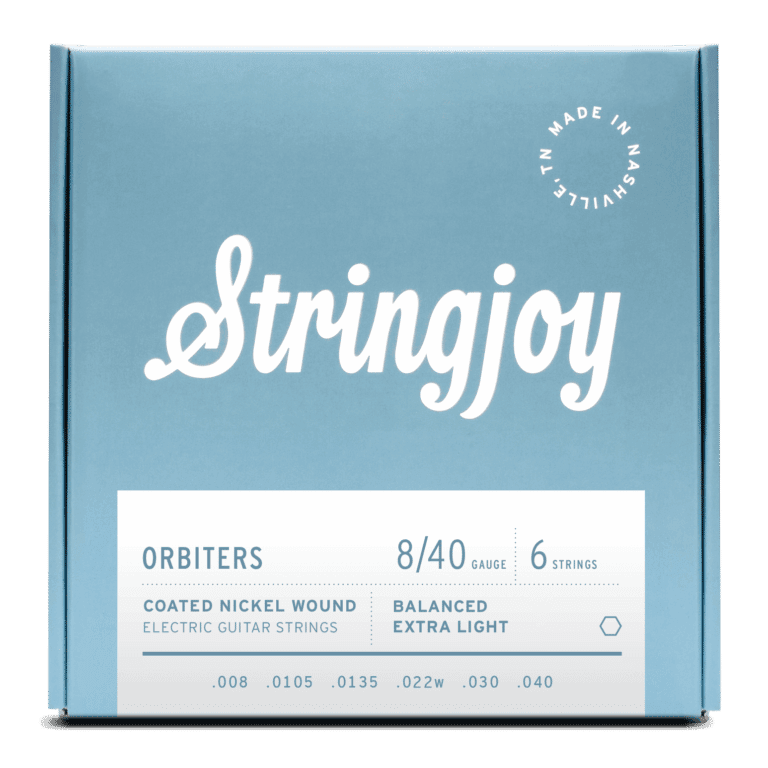
Stringjoy 8-40 Balanced Extra Light Gauge Orbiters - Coated Nickel Electric Guitar Strings
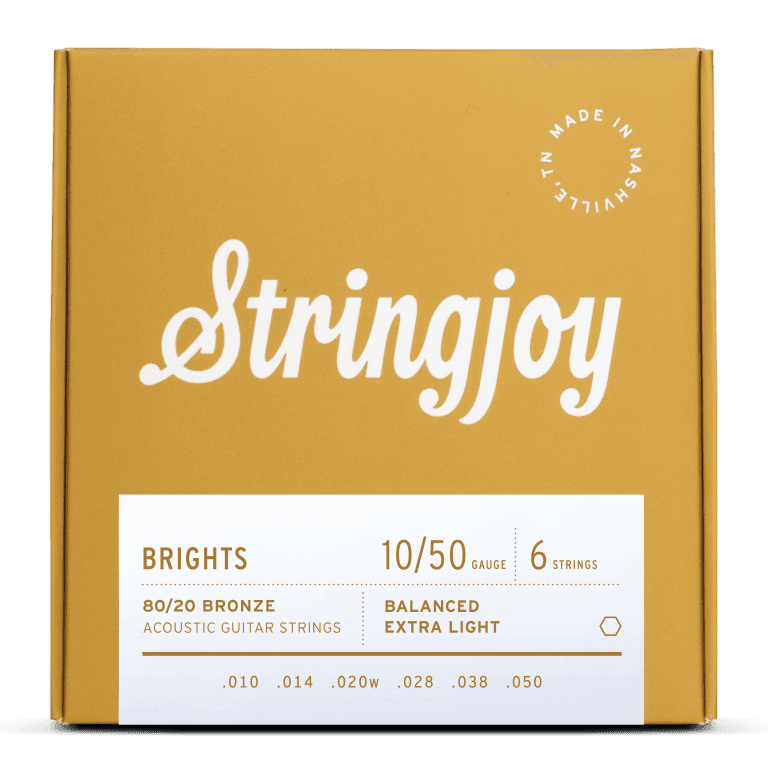
Stringjoy 10-50 Extra Light Gauge Brights - 80/20 Bronze Acoustic Guitar Strings
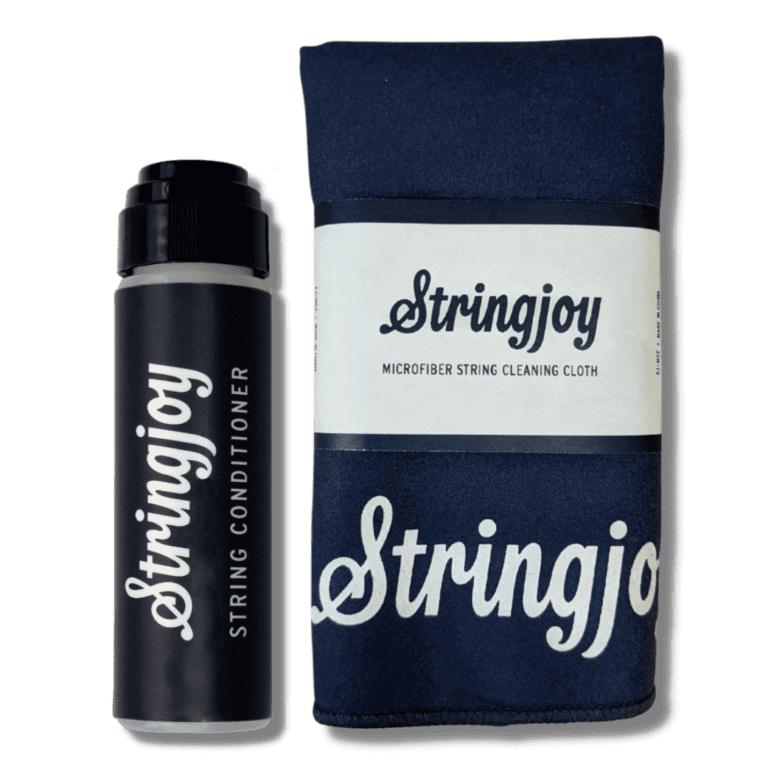
Stringjoy Natural Guitar String Conditioner & Microfiber Cleaning Cloth Bundle
Choose Strings That Make You Want to Play!
Choosing guitar strings doesn’t need to be complicated. Focus on comfort, tone, and playability. The right strings can make learning easier, playing more enjoyable, and your guitar more inspiring. With this in mind, we strongly recommend you check out our aforementioned Soft Touch sets if you're just getting started with guitar.
Find a set that works for you, string up, and enjoy the journey!
(And if you have any questions... get in touch!)
Other Posts you may like

Guitar Strings Order: How the Guitar is Tuned and Why

Two Handed Tapping: Our Top 8 Tappers of All Time
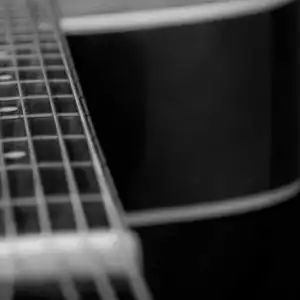
Which Guitar Strings Wear Your Fret Wire Down More?
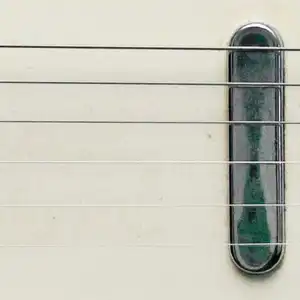
What is Nashville Tuning? Its History, Best Guitar Strings & Uses
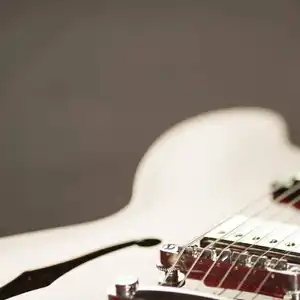
Guitar Scale Length Explained: String Tension & Playability

What Guitar Strings I Used To Play...
0 Responses
Leave a Reply
Your email address will not be published. Required fields are marked *

